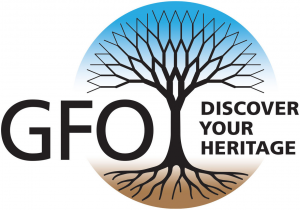
| THE GENEALOGICAL FORUM’s Thursday Evening E-News Edition January 23, 2020 |
| Curious about the status of your GFO Membership? We’d love to have you as a GFO Member! |
| gfo.org | 503-963-1932 | info@gfo.org Be sure to check the complete GFO CALENDAR. Also, don’t miss the current issue of The Forum Insider |
| GFO Objects to Closure of National Archives Seattle |
| This week we were startled to learn that a secret plan to close The National Archives at Seattle is nearly a done deal. This facility provides access to permanent records created by Federal agencies and courts in Oregon, Washington, Alaska, and Idaho. Without the reporting of KIRO radio in Seattle, no one would have known this closure was in the works. |
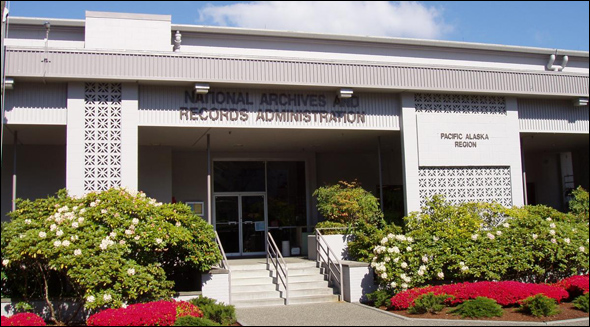
| Despite
the lack of any public comment period, the GFO sent the following email
to Russell Vought, the acting director of the Office and Management and
Budget: Dear Mr. Vought, I
am writing on behalf of the Board of Directors and the 1075 members of
the Genealogical Forum of Oregon to register our strong objections to
the planned closure of Seattle’s National Archives facility. The
decision to close this federal repository of public records was made in
complete secrecy, with no input from the public or any other government
entities in the region. No local hearings or requests for feedback were
held in Washington, nor in Alaska, Idaho, Montana, or Oregon. The
Seattle National Archives and Records Center holds records, mostly
un-digitized, starting in the 1840s for the five NW states. These
records are vital public documents for anyone researching American
history. No
consideration of the importance of maintaining archival resources in
the Pacific was made. The National Archives goals do not appear to
include keeping local resources close to their origin and where most use
will occur. We must ask, “Why not?” It
is vital these record are kept in our region and remain accessible.
Transferring records relevant to the Pacific Northwest to a records
center in Kansas City, Missouri, effectively bars access to those to
whom the records are most relevant. We
urge you to keep Northwest records where they will be most used, and to
keep the expert archives staff who specialize in Pacific Northwest
records. Vince Patton President, Genealogical Forum of Oregon |
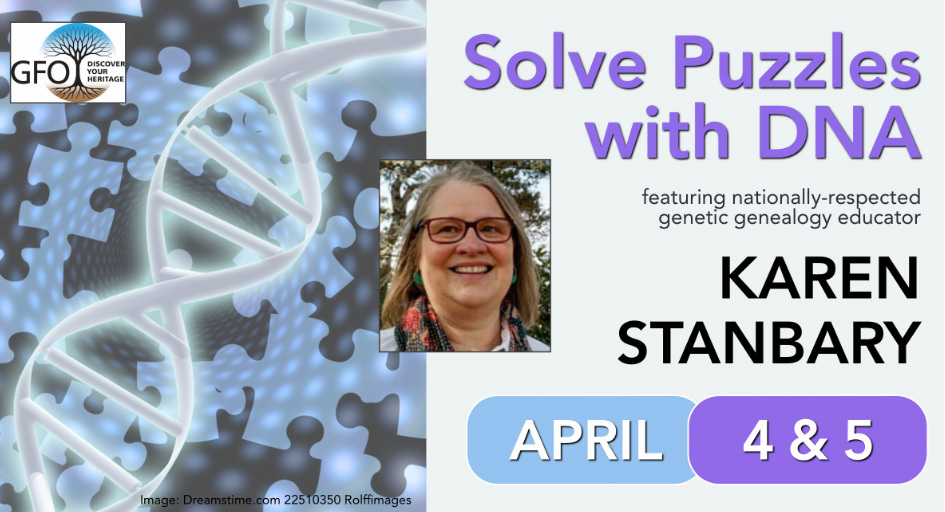
| Join us for our 2020 Spring Seminar, “Solve Puzzles with DNA,” on April 4 & 5, to be presented by nationally-recognized genetic genealogy author and educator Karen Stanbary, CG®, MA, LCSW. |
| The Saturday, April 4 classes, will be held from 10:00 a.m. to 4:30 p.m.at Portland’s Center for Self Enhancement (SEI).
Karen will guide experienced beginners and above in learning how to
manage and interpret DNA evidence, then how to incorporate it into
existing documentary research and provide guidance on managing
conversations about unexpected DNA results. If you register now, the
cost for GFO members for this full day is just $45 and for non-members,
$50. The
Sunday half-day classes on April 5 will be held at the GFO from 9:30
a.m. – Noon. Deepen and expand your intermediate- to advanced-level
skills as Karen presents more complex genealogy puzzles requiring more
complex DNA evidence analysis. Early registration price for this
half-day is just $25 for GFO members and $30 for non-members. Download the Seminar Flyer for more details. Take advantage of those Early-Bird Registration prices! On March 1, all prices will increase by $5. This is a great opportunity to learn more about solving those genealogy puzzles with the use of DNA. |
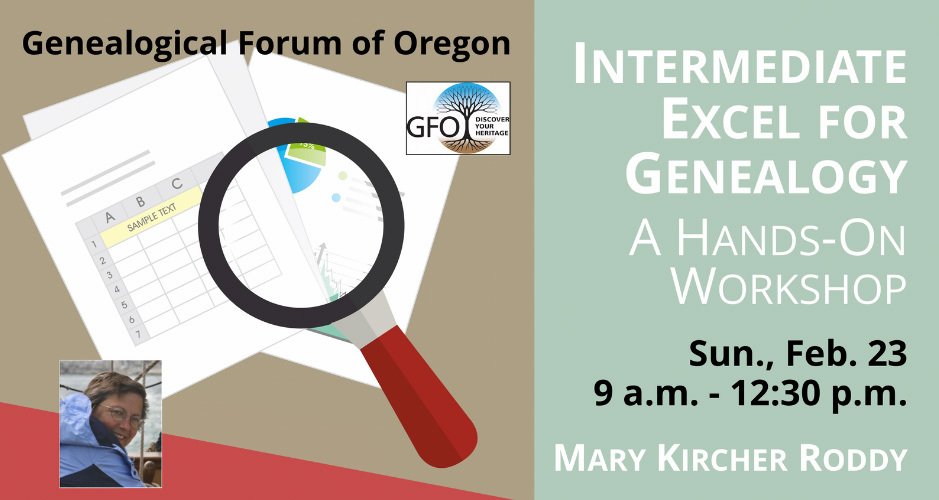
| Spreadsheets can be a powerful tool to help you analyze your genealogical data and keepi track of your research; and they are essential in managing your DNA information. |
| From 9:00 a.m. – 12:30 p.m. on Sunday, February 23, join BCG Certified Genealogist, Mary Kircher Roddy, as she presents a hands-on guide for the experienced spreadsheet user using Excel to gain perspective on and to further your genealogy research. For a more complete description, download the seminar flyer. Seating is limited to 30 people! Everyone gets a spot at a table. Participants should bring their (fully charged) laptops pre-loaded with Excel. Mary is an active member of Seattle Genealogical Society, the Genealogical Speakers Guild, the Association of Professional Genealogists, and the National Genealogical Society. She has published articles in Family Chronicle, Internet Genealogy, and the National Genealogical Society Quarterly. For Early-Bird Registration on or before Jan. 31, the fee is $30.00 for GFO Members and $35.00 for non-members. You’ve got one more week before the price increases $5 on Feb. 1. |
| GFO Stars: Manuscripts Committee Volunteers |
| This month, the GFO Board is proud to select four volunteers as our GFO Stars of January. Cat Cope-Arnold, Anita Lustenberger, Bonnie Randolph, and Ruth Summers have contributed hundreds of hours over several years to help with one goal—creating digital files from 350,000 pages of donated personal papers collected by the GFO. |
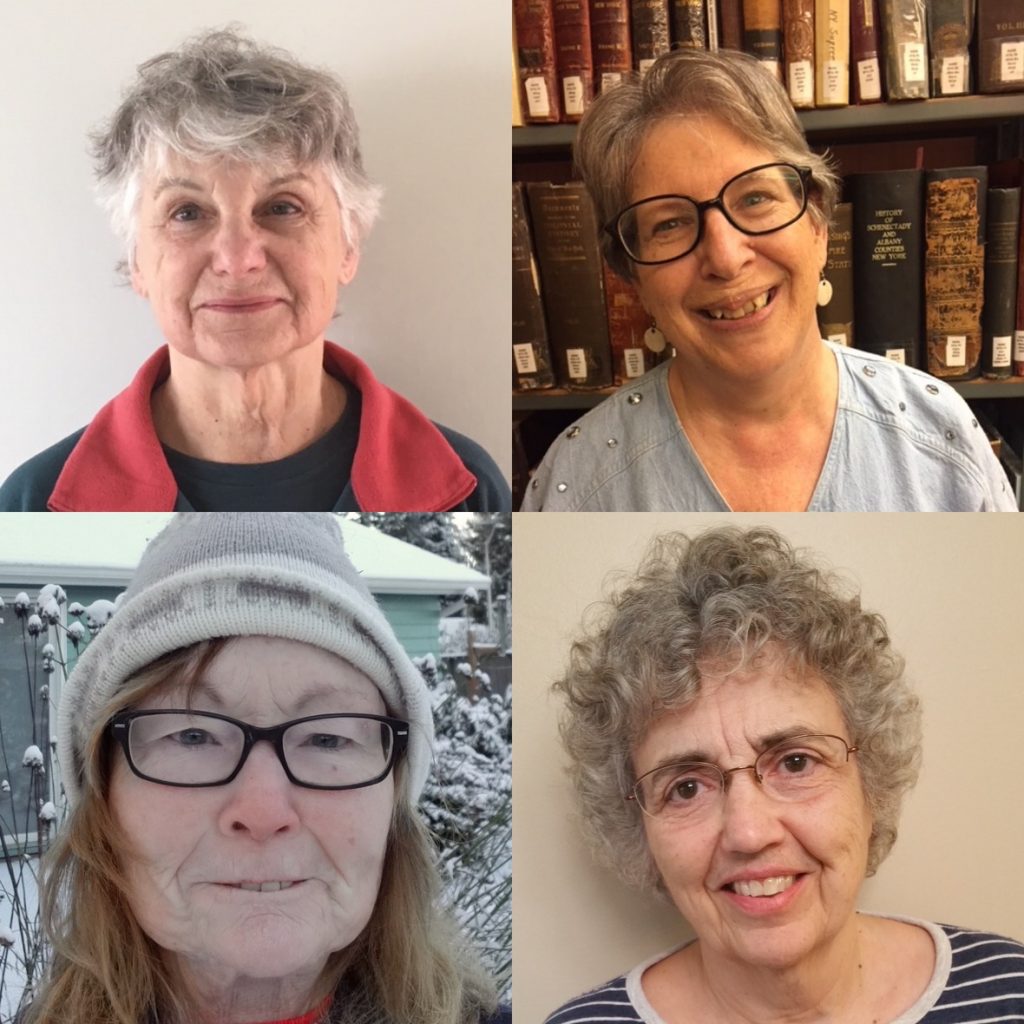
| Top left, clockwise: Anita Lustenberger, Cat Cope-Arnold, Bonnie Randolph, and Ruth Summers |
| They sort, remove staples, unfold, and scan these papers so that one researcher’s life work can be available to others. Because of their dedication, there is an end in sight for this project! Thank you Anita, Bonnie, Cat, and Ruth! |
| Needed: Volunteers with Adobe Acrobat Pro Software |

| We need help to process our scanned periodicals! Sunday work parties have been lively, with volunteers prepping and scanning GFO’s periodicals collection while chatting about all things genealogy. To keep up with the steady stream of material, we need more people to help with the computer processing. Using Adobe Acrobat Pro, the scans are combined, reviewed for problems, and text recognition processing is done. If you have the software needed and can help, please contact Laurel Smith at library@gfo.org. |
| News from the Library |
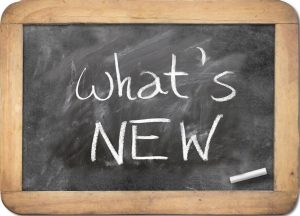
| New Books ▪ A history of the German language: with special reference to the cultural and social forces that shaped the standard literary language ▪ Book of Gobi: Siskiyou Smokejumper Base, 1943-1981 ▪ City in the forest: the story of Lansing ▪ Estate records of Edgecombe County, North Carolina, 1730-1850 ▪ Garrett Surname: Ireland: 1600s To 1900s ▪ How our ancestors died: a guide for family historians ▪ Richardson County, Nebraska, 1985 ▪ Sesquicentennial sampler, a history of Mormons in the Rogue Valley (Oregon): to commemorate the 150th anniversary of the Church of Jesus Christ of Latter-day Saints ▪ Surname atlas of Germany ▪ Texas in 1850 ▪ The Applegate Trail of 1846: a documentary guide to the original southern emigrant route to Oregon ▪ The descendants of Alonzo Bartlett (1843-1933) and Ellen Bassett (1851-1897) ▪ The Family Tree cemetery field guide: how to find, record, & preserve your ancestors’ graves ▪ The great fire of London. ▪ The parish registers of Gulval (alias Lanisley) in the County of Cornwall (1598-1812) ▪ The Sutherland pioneers of Beaverton and Woodville, Ontario, Canada. ▪ The Virginia military surveys of Clermont and Hamilton Counties, Ohio, 1787-1849 ▪ Tracing your docker ancestors: a guide for family historians ▪ Tracing your Freemason, friendly society and trade union ancestors: a guide for family historians ▪ We, the people … of Winnebago County. Winnebago County Bicentennial Commission, 1975 New Digital Files ▪ Barney Family News ▪ Forge: the Bigelow Society quarterly ▪ WPA Historical Records Survey: Benton County Commissioners’ Journal, 1850-1855, Probate Book A ▪ WPA Historical Records Survey: Benton County, Oregon Cemetery Records ▪ WPA Historical Records Survey: Benton County, Oregon Churches |
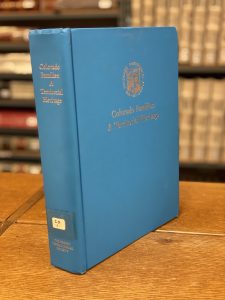
| Do you have Colorado roots? There’s a very good bet your people are mentioned in this book. Colorado Families: A Territorial Heritage includes 40,000 individuals in its 735 page. This is a big work of history. The Colorado Genealogical Society encouraged everyone with ancestors settling in Colorado before January 1, 1877, to submit information. This book says, “Every pioneer was eligible, regardless of race, creed, nationality or ghost |
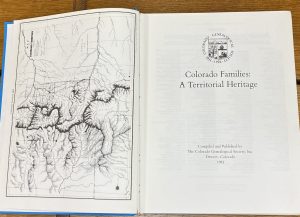
| in the family closet. Never has a Colorado history book included so many people – some 40,000 individuals.” They also add that they “made special efforts to recruit minority histories.” Colorado Families was published in 1981. |
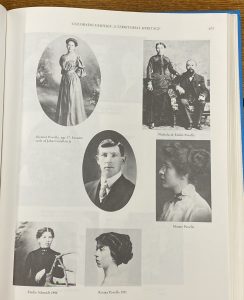
| This
copy is a retired library book with one library mark inside and a label
on its spine. Otherwise, this heavy volume is in truly excellent
condition. Our price to pickup: $35 Price to ship to you: $45 If you’d like to buy this book, email booksales@gfo.org. |
| Survey Results: You and the Family History Library |
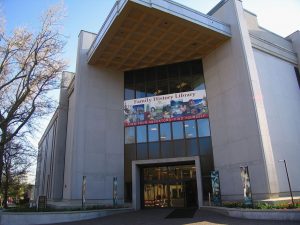
| Forty-seven people responded to our survey about the Family History Library in Salt Lake City. Of those, 66% reported having gone to the library to do research, and 100% of those said it was worth the trip! When asked if being unable to order microfilms would increase or decrease likelihood of a visit, most respondents said it made no difference. And all the digitized microfilms available through FamilySearch didn’t make a difference either. So it seems that most of us are hooked on the Family History Library. Here are some of the tips we received to help you plan your visit***: |
| Consult articles on prepping for your visit at FamilySearch and at FamilyTree Magazine. Organize. Prepare ahead. Have your research problem outlined clearly before you go, make a research list, and check the library catalog to be sure that you put in an advanced request for books and microfilm you want to see that are not on the shelves or in the building. |

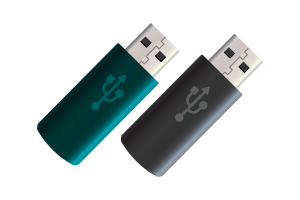
| Once at the archives, stick to working on your research goals and don’t allow yourself to get distracted by other books or materials. Have options and alternatives – a Plan B – if your initial plan doesn’t work out. Before you go, use their catalog to make a list of what is only available at the library for research. Then organize by type of records and focus on that type until completed. Don’t spend a lot of time reading. Take a flash drive and save what you find. If the item is an original document make a photocopy. Verify that the items are saving to the flash drive. Take only photocopies of important documents you might want to reference or, better yet, scan them and have them on your thumb drive. Label your thumb drive with your address and phone number should you leave it at a work station or in a computer. Put a clearly named file on the drive with your contact information. |
| Be sure to visit the first floor you can now print a free big color fan chart from your FamilySearch tree. It’s nine generations and a big help in seeing where you need to concentrate your efforts. Go have fun. If you don’t feel satisfied with the first person who assists you, ask someone else. Everyone there is very friendly. Build in time in case you need to go the Utah State Archives. Particularly for divorce records in the early 1870s as UT was a divorce mecca with some done via mail. Allow as many days as possible, [as well as] time to eat. Look over your work on Sunday and go back Monday to reconcile problems. MY QUESTION — Would GFO ever organize/conduct a trip to the FHL in SLC? Go early in December, not very busy then. *Note that some responses have been combined or edited for brevity. |

| New Survey: Your Learning Style One of our respondents wanted us to ask our readers, “How do you learn best?” |
| Saturday, January 25th DNA Advanced Group 9:00 a.m – 12:00 p.m. Join us for two presentations: GEDmatch: An Introduction will be presented by Lisa McCullough. Handout can be downloaded here. Maximizing Your Use of GEDmatch – will be presented by Tim Janzen. Handout can be downloaded here. Any questions? Contact dna@gfo.org. British Interest Group 1:00 – 3:00 p.m. This group’s focus is on researching in the British Isles: England, Wales, Scotland, and Scots-Irish. This month, we will discuss online sources, news, The Highland Clearances in Scotland, and any recent successes. Also, bring those brick walls if you got ’em. Questions to group facilitator, Duane Funk at uk@gfo.org. Sunday, January 26th Library Work Party 9:00 a.m. – 5 p.m. Come help with the digitizing effort. Doors open at 9 and work will likely continue most of the day. Some people come for just an hour or so; others work the full time. You are welcome to do either. Any time you can share is valuable. Come join in the fun. Wednesday, January 29th GFO Library Open Late to 8:00 p.m. |